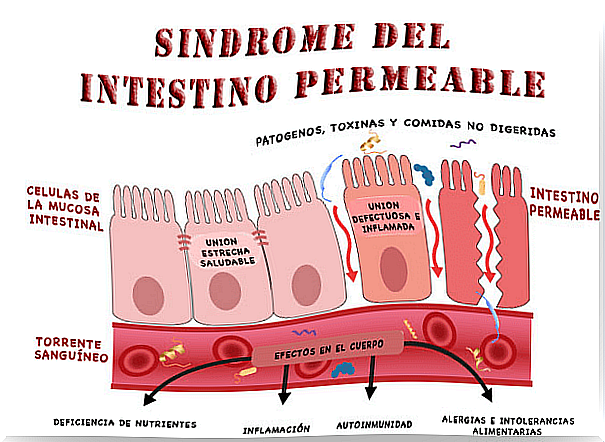What Is A Leaky Gut And How Can It Affect Your Health?
In addition to physical conditions, leaky gut syndrome can also cause psychological conditions, such as depression and chronic fatigue, which appear due to the action of antibodies

Do you feel stomachache and fatigue on a daily basis? Do you have hives or skin allergies? If so, you should know that you could be suffering from leaky gut syndrome. This condition is not well known among the population and most of the time it is ignored due to its resemblance to other common conditions.
The truth is that the cases of those affected have increased in recent years and there is growing concern about the lack of information in the community.
To begin to understand it, it is essential to know that the digestive system plays a major role in the overall health of the body. If this begins to fail, it is most likely that a series of symptoms and diseases will be triggered that deteriorate the quality of life.
Precisely for this reason, developing intestinal permeability is a serious problem that must be addressed in time.
What is Leaky Gut Syndrome?

By nature, the gut is permeable, letting tiny molecules pass so the body can absorb nutrients from food. In fact, the cells found in the intestinal walls have the function of regulating this permeability.
Generally, the problem occurs when a strong inflammation is triggered in the walls, which allows toxins to leak into the bloodstream.
As these begin to be transported throughout the body, the immune system identifies them as invaders and generates immune responses that are manifested through various symptoms. Because of this, it has been determined that gastrointestinal health is involved in the regulation of much of the body’s systems.
Although its exact role in relation to other diseases has not been established, there is much evidence that intestinal permeability is strongly linked to other diseases.
What are the causes of leaky gut syndrome?
The cause of increased intestinal permeability continues to be a topic of debate in the scientific community. However, from the cases that have been studied, it has been determined that there are some related factors.
Feeding

Excessive consumption of gluten can be one of the causes of this condition for people with celiac disease. As expected, this increases the inflammatory response of the intestine, which facilitates the passage of waste into the blood.
Infections
Having some types of infections also increases the risk of developing this syndrome. Candidiasis, roundworms, H. Pylori proliferation, and small intestinal bacterial overgrowth (SIBO) are some associated.
Toxins

The toxins that reach the body cause serious health problems when they are not eliminated properly.
These can be found in various types of drugs such as antacids and antibiotics. There are also high concentrations in the environment due to pesticides, industrial wastes, and general pollution.
Stress
Being constantly exposed to stress causes a weakening of the immune system and many times alters inflammatory processes in the body. Any type of factor that increases inflammation in the digestive tract can lead to a diseased intestine.
How can leaky gut affect health?
Due to the presence of toxins and intestinal materials in the bloodstream, leaky gut syndrome has a lot to do with various disorders and allergies.
The most striking conditions are chronic fatigue syndrome and depression, which appear to be triggered by the action of antibodies that try to eliminate gram-negative bacteria that leak into the blood.
However, in addition to these two, there are other conditions with which it has been linked :
- Bloating and intestinal gas.
- Diarrhea or constipation
- Irritable bowel syndrome
- Ulcerative colitis
- Rheumatoid arthritis.
- Celiac disease
- Lupus or psoriasis.
- Seasonal allergies and asthma.
- Chronic sinusitis.
- Eczema.
- Urticaria.
- Chronic acne
- Rosacea.
- Polycystic ovary syndrome.
- Fibromyalgia
- Candidiasis
- Food intolerances.
- Headaches and migraines.
Having constant episodes of these conditions or having several at the same time can be an indication of increased intestinal permeability. In these cases, it is best to consult the doctor and review the possible habits that may be causing it.
As a complement to the treatment, the consumption of probiotics, omega 3 and essential minerals can be increased. Likewise, you should eat more raw fruits and vegetables that contain water, fiber and antioxidants.









